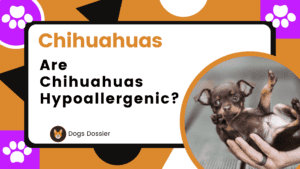Are Golden Retrievers Hypoallergenic?
Golden Retrievers hold a special place in the hearts of many dog lovers, renowned for their friendly demeanor, intelligence, and loyalty.
However, for individuals prone to allergies, concerns about potential reactions to pet dander often arise.
In this article, we delve into the question: Are Golden Retrievers hypoallergenic?
Let’s explore the facts, dispel myths, and uncover practical solutions for allergy-prone households considering adding a Golden Retriever to their family.
Understanding Hypoallergenic Dogs
To grasp the concept of hypoallergenic dogs, it’s essential to dissect the term itself.
Originating from the Greek prefix “hypo,” meaning “less than,” and “allergenic,” relating to substances that trigger allergic reactions, hypoallergenic denotes products or breeds perceived as less likely to provoke allergic responses.
However, it’s crucial to recognize that no dog breed is entirely hypoallergenic, as all dogs produce dander to some extent.

The Myth of Hypoallergenic Breeds
Contrary to popular belief, there isn’t a breed of dog that is entirely hypoallergenic.
While certain breeds, such as Poodles and Bichon Frises, are touted as hypoallergenic due to their low-shedding coats, they still produce dander, albeit in lesser quantities.
Additionally, allergies vary from person to person, making it challenging to predict how individuals will react to specific breeds.
Understanding Allergies to Dogs
Allergies to dogs, including breeds like Golden Retrievers, can present challenges for individuals seeking to share their lives with these beloved pets.
What Causes Dog Allergies?
Dog allergies typically result from proteins found in the dog’s dander (skin flakes), saliva, and urine.
Allergens can become airborne and trigger allergic reactions when inhaled or come into contact with the skin or mucous membranes.
Common Symptoms of Dog Allergies
- Sneezing, coughing, and wheezing
- Runny or congested nose
- Itchy, watery eyes
- Skin rashes, hives, or eczema
- Difficulty breathing or asthma exacerbation
Understanding Allergenic Dog Breeds
While no dog breed is completely hypoallergenic, certain breeds, such as Golden Retrievers, are known to produce more dander and allergens due to their shedding coats.
Individuals with allergies may experience varying degrees of sensitivity to different breeds.
Managing Dog Allergies
- Regular grooming and bathing: Frequent grooming sessions and baths can help reduce the amount of dander and allergens on the dog’s coat.
- Environmental control: Implementing measures like using HEPA air filters, vacuuming with a high-efficiency vacuum cleaner, and washing bedding regularly can minimize allergen exposure indoors.
- Allergy medication: Over-the-counter or prescription allergy medications may alleviate symptoms such as itching, sneezing, and congestion.
- Immunotherapy: Allergy shots or sublingual immunotherapy (under-the-tongue tablets) can help desensitize individuals to specific allergens over time.

Preventive Measures for Allergy-Prone Individuals
- Conducting allergy testing: Allergy testing can identify specific allergens, including dog dander, to guide treatment and management strategies.
- Limiting exposure: Minimizing direct contact with dogs, especially in confined spaces, and creating designated pet-free areas in the home can reduce allergen exposure.
- Practicing good hygiene: Washing hands and clothes after interacting with dogs and avoiding touching the face can prevent allergens from spreading and triggering allergic reactions.
Golden Retrievers and Allergies
Golden Retrievers are beloved for their friendly disposition and loyal companionship, but for some individuals, allergies can pose a challenge when considering adding one of these dogs to the family.
Allergies and Golden Retrievers: The Basics
While Golden Retrievers are not considered hypoallergenic, their fluffy coats and shedding tendencies can trigger allergic reactions in sensitive individuals.
Understanding the factors that contribute to allergies in Golden Retrievers, including dander, saliva, and urine proteins, is crucial for prospective owners.
Managing Allergies with Golden Retrievers
- Grooming: Regular grooming and bathing can help reduce dander and allergens on the dog’s coat, minimizing allergic reactions.
- Environmental Control: Implementing measures such as using hypoallergenic bedding, vacuuming frequently, and maintaining a clean living environment can create a more allergy-friendly space.
- Allergy Medication: Consultation with a healthcare professional can guide allergy medication and treatment options to alleviate symptoms associated with Golden Retriever allergies.
The Importance of Allergy Testing
Before bringing a Golden Retriever into the home, allergy testing can help determine individual sensitivities and assess the likelihood of experiencing allergic reactions.
Interacting with Golden Retrievers in various environments, such as shelters or with friends or family who own the breed, can offer insights into potential allergic responses.
Long-Term Considerations
Recognizing that allergies may change over time is essential for long-term Golden Retriever ownership.
Monitoring allergic reactions and adapting grooming and environmental control strategies as needed can help maintain a harmonious relationship between owners and their beloved pets.

The Dynamic Nature of Allergies: Puppy vs. Adult Golden Retrievers
The journey of pet ownership, particularly with Golden Retrievers, can present unexpected challenges for allergy-prone individuals.
While a Golden Retriever puppy may initially seem compatible with a household, allergic reactions can intensify as the dog matures into adulthood.
This transition underscores the dynamic nature of allergies and the importance of thorough consideration before bringing a Golden Retriever into your family.
As dogs age, their fur composition and dander production evolve, potentially exacerbating allergic responses in susceptible individuals.
While some human allergies manifest immediately, others may emerge over time, progressing in severity during adulthood.
Therefore, prospective Golden Retriever owners should spend time with adult dogs in addition to interacting with puppies to assess their compatibility and potential allergy triggers.
It’s essential to acknowledge the emotional impact of rehoming a loyal companion years into their life with a family.
Making an informed decision when adopting a young, non-hypoallergenic dog like a Golden Retriever involves weighing all considerations, including the possibility of developing allergies over time.
In a related scenario, pregnant Golden Retriever owners may experience sudden allergic reactions to their long-time canine companions.
Hormonal fluctuations and heightened immune responses during pregnancy can amplify sensitivity to dog dander, leading to discomfort for expectant mothers.
However, research suggests that exposure to pets and their dander may confer long-term benefits, such as bolstering the fetus’s immune system.
While sneezing episodes during pregnancy may not be ideal, they could contribute to the development of beneficial antibodies in the baby’s cord blood.
Navigating the complexities of allergies in the context of Golden Retriever ownership requires careful consideration and proactive measures to ensure the well-being of both the dog and the family.
By understanding the evolving nature of allergies and the potential implications for pet ownership, individuals can make informed decisions that prioritize health and harmony within the household.
Managing Allergies in Golden Retrievers
Despite their propensity for shedding, allergy-prone individuals can coexist harmoniously with Golden Retrievers by implementing proactive measures:
- Regular Grooming: Maintain a consistent grooming routine to minimize shedding and dander accumulation. Brushing your Golden Retriever regularly helps remove loose fur and reduce the spread of allergens.
- Allergy-Friendly Diet: Opt for high-quality, hypoallergenic dog food formulations that promote skin and coat health. A nutritious diet can mitigate skin issues and reduce excessive shedding, thereby minimizing allergen exposure.
- Environmental Control: Implement strategies to reduce allergen levels in your home environment. Invest in HEPA air purifiers, wash bedding and upholstery frequently, and designate pet-free zones to minimize allergen dispersion.
- Personal Hygiene: Practice good personal hygiene by washing your hands and face after interacting with your Golden Retriever. Additionally, avoid allowing your pet to sleep on your bed to minimize allergen exposure during sleep.
FAQs: Golden Retriever hypoallergenic
Can Golden Retrievers cause allergies?
Golden Retrievers can trigger allergic reactions in sensitive individuals due to the presence of allergenic proteins in their saliva, urine, and dander.
Are there any hypoallergenic dog breeds?
While certain breeds are considered hypoallergenic due to their low-shedding coats, no breed is entirely hypoallergenic, as all dogs produce dander to some extent.
How can I minimize allergies to Golden Retrievers?
Regular grooming, allergy-friendly diet, environmental control measures, and personal hygiene practices can help minimize allergic reactions to Golden Retrievers.
Do Golden Retrievers shed a lot?
Yes, Golden Retrievers are known for their moderate to heavy shedding, especially during seasonal coat blows.
Can allergies to Golden Retrievers develop over time?
Yes, allergies to Golden Retrievers or any dog breed can develop or worsen over time, highlighting the importance of proactive management and allergen avoidance.
Conclusion
While Golden Retrievers may not be hypoallergenic, proactive management strategies can enable individuals with allergies to enjoy the companionship of these beloved dogs.
By understanding the factors contributing to allergic reactions and implementing practical solutions, allergy-prone households can create a welcoming environment for their furry companions while minimizing discomfort and allergic symptoms.





